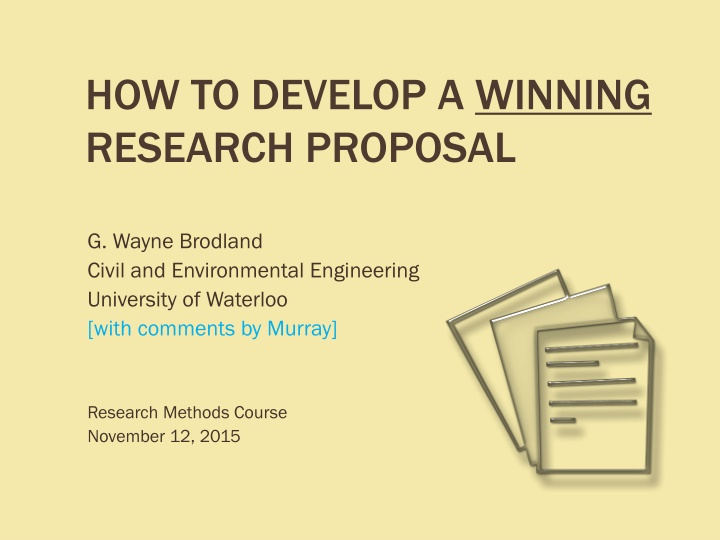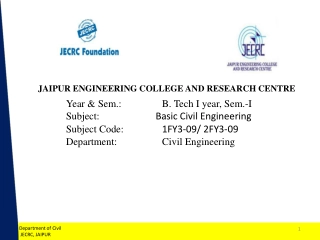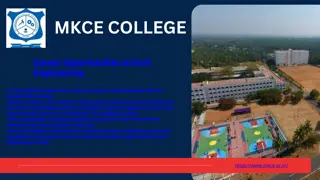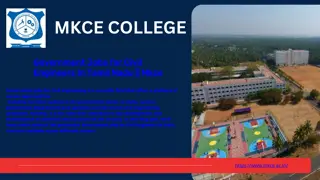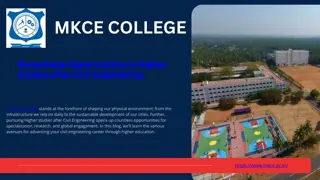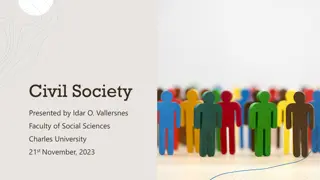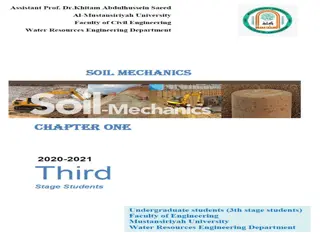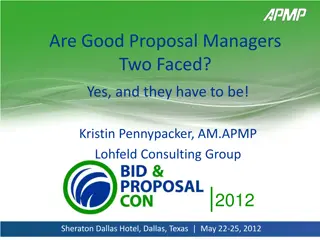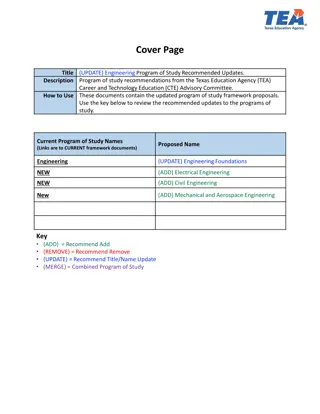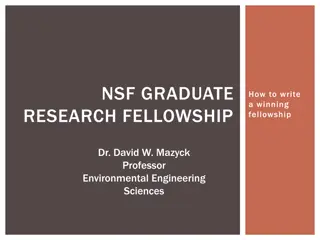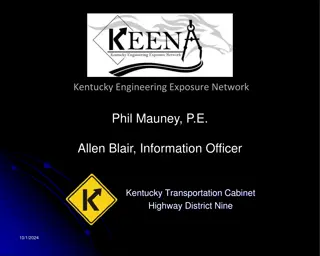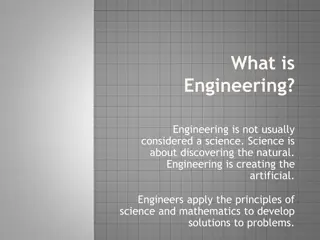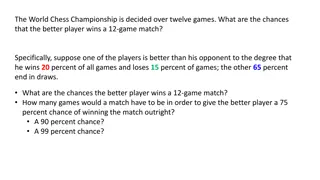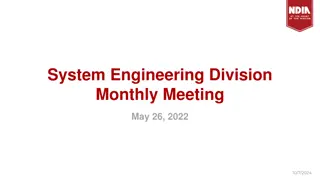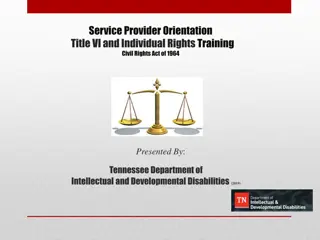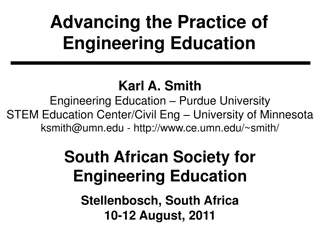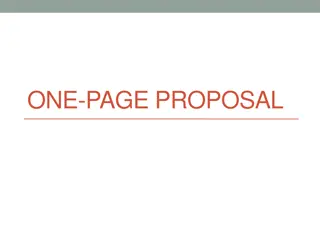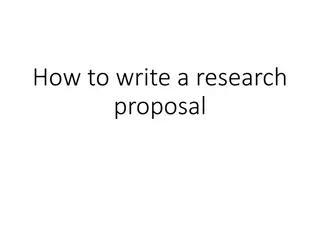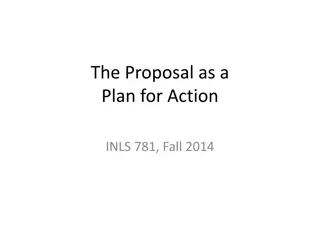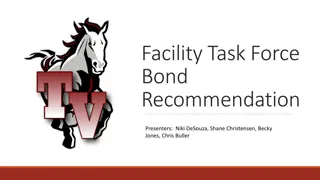Developing a Winning Research Proposal in Civil and Environmental Engineering
Successfully crafting a winning research proposal is crucial for academic success, particularly in fields like Civil and Environmental Engineering. This involves putting forward a comprehensive plan for independent and original research, meeting specific degree requirements, and understanding the key components of a proposal. Learn how to articulate your research goals effectively and navigate the proposal process with the right strategies and insights.
Download Presentation

Please find below an Image/Link to download the presentation.
The content on the website is provided AS IS for your information and personal use only. It may not be sold, licensed, or shared on other websites without obtaining consent from the author.If you encounter any issues during the download, it is possible that the publisher has removed the file from their server.
You are allowed to download the files provided on this website for personal or commercial use, subject to the condition that they are used lawfully. All files are the property of their respective owners.
The content on the website is provided AS IS for your information and personal use only. It may not be sold, licensed, or shared on other websites without obtaining consent from the author.
E N D
Presentation Transcript
HOW TO DEVELOP A WINNING RESEARCH PROPOSAL G. Wayne Brodland Civil and Environmental Engineering University of Waterloo [with comments by Murray] Research Methods Course November 12, 2015
WHAT EFFECT DOES THIS PHOTO HAVE ON YOU? http://english.sina.com/china/p/1/2007/0426/110686.html
WHAT DO YOU YOUTHINK SCIENCE LOOKS LIKE? Where are the gaps? Paint a hole http://www.rosiehippo.com/c-151-building-and-stacking.aspx http://buildingblocksblog.com/
DEGREE REQUIREMENTS DEGREE REQUIREMENTS The PhD degree is awarded for the accomplishment of independent and original research and reporting thereon in a dissertation. The normal requirements for the PhD degree are as follows: Satisfactory completion of three one-term (0.5 unit weight) (600 or 700 series) graduate level courses acceptable for graduate credit by the Department with an overall average of 70%. Satisfactory performance in a Comprehensive examination. The examination consists of the following two parts: an examination of the research proposal research proposal that the candidate intends to develop into a successful PhD research thesis an examination of the breadth of the candidate's knowledge in the field of research. Submission and oral defense of a thesis, embodying the results of original research. Required to attend 20 Seminars within your program time limit. (Master s Seminar, PhD Comprehensive or Defense or External Seminar).
WHAT IS A PROPOSAL? A proposal is an act of putting forward or stating something for consideration Merriam online dictionary
TWO PROPOSALS: TWO PROPOSALS: [WITH MURRAY S ADDED COMMENTS] Data on Ontario Bridges I plan to visit all of the bridges in Ontario and collect information about bridge size and span, structural materials used and the condition of each bridge. I will use total station survey equipment and ultrasonic transducers to collect this data. I would like to make this data available to all interested parties. The data I collect will be helpful to the government. It will also be of great interest to other researchers. Problems: Overuse of I Oxford comma (serial comma) Is caught by Grammarly Beholder word Simplistic sentence structure Short sentences at end are choppy , not fluent and smooth More about this in Lesson 7
TWO PROPOSALS: TWO PROPOSALS: Data on Ontario Bridges I plan to visit all of the bridges in Ontario and collect information about bridge size and span, structural materials used and the condition of each bridge. I will use total station survey equipment and ultrasonic transducers to collect this data. I would like to make this data available to all interested parties. The data I collect will be helpful to the government. It will also be of great interest to other researchers. Ontario Bridge Survey For the Government of Ontario to make informed decisions regarding infrastructure planning, it needs a comprehensive survey of all public bridges in the province. My goal is to build this urgently-needed database by visiting all such bridges and collecting geometric, structural, and surface- condition data using state-of-the-art equipment. The data will be made available through a public website.
Who cares? What have others done? Significance State-of-the-art The IDEA How much will it cost? How will you carry out your idea? Resources Methodology Evaluation Is the idea worth pursuing? Safety / collaborators / equipment / data availability
THE DOCUMENT 1. Abstract [for research proposal] 2. (Acknowledgements) 3. Introduction 4. Literature Review 5. Methodology 6. Preliminary Results 7. Conclusions 8. Future Work 9. Reference List [Although this PowerPoint file is about Research Proposals rather than Journal Papers, much of the information applies to both.]
THE KEY INGREDIENTS Generate an IDEA Novelty, meaning Convey it Clarity, precision Convince the reader Value Would make the world a better place Get audience buy-in Personal engagement Desire We need to do this
ABSTRACT (2 PAGES) [NOT A RESEARCH PAPER ABSTRACT] A brief, (generally) semi-technical overview of your IDEA Explain your IDEA to a family member - i.e., to a non-techie Always paint a hole [= bring attention to a missing piece of knowledge] Make sure all relevant keywords appear in the abstract Make sure all relevant keywords appear in the abstract Use one or more sentences to summarize the highlight(s) of each chapter: Set scene relate your IDEA to the real world Identify the hole Address who cares? Give numbers, if possible Present your goal(s) Outline your plan and methods Explain your expected (and/or achieved) results What do the findings mean? What is their significance? How will your efforts make the world a better place? Does the reader know what you plan to do, why you will do it, how you will do it, and whether your success will make any real difference in the world?
INTRODUCTION (3-5 PAGES) A more detailed and technical overview than the abstract. Write this for someone with some knowledge in the field Use one or more paragraphs to summarize each chapter: Set scene relate your idea to the real world address big picture and small picture issues More clearly identify the hole Address who cares? Give numbers, if possible Present your goal(s) be specific Outline your plan and methods give key details Explain your expected (and/or achieved) results What do the findings mean? What is their significance? How will your efforts make the world a better place? What is your project about? Who cares?
LITERATURE REVIEW (7-20 PAGES) Explains the current state-of-the-art Makes the reader an expert on the background relevant to your project Relates your project to what is known Describes the hole with precision Makes it clear why your goals address the hole Might discuss philosophy i.e., big picture Explain why your proposed work is important Describe the exact boundaries of current relevant knowledge Discuss the strengths and limitations of proposed methods What have other people done in this area? Why is it important for you to do what you propose?
METHODOLOGY (11-20 PAGES) Explain what you are going to do and how you will do it. Outline the steps Show data flow Explain analysis methods Discuss reliability and accuracy if appropriate Explain what new knowledge is expected Remind the reader about the significance of what you are doing Provide enough detail that someone versed in the art could do the work themselves (but keep a few secrets to yourself) Provide timelines and budgets. Relate to the plan What will you do? How will you do it? Does your plan achieve your stated goals? Is your plan feasible?
(PRELIMINARY) RESULTS (7-15 PAGES) Show that you will be able to do what you propose Demonstrate the key steps in your plan by example Use synthetic data if appropriate Are your results generally what you expected? If not, why? Does your plan have a high probability of success?
DISCUSSION AND CONCLUSIONS (3-5 PAGES) Identify successes to date Identify potential problem areas Explain what you will do if your Plan A does not work Show me how your efforts are likely to make the world a better place Is there value in the results? How will your findings make the world a better place?
FUTURE WORK (2-3 PAGES) For a Proposal (additional steps that you must complete in order to succeed): How will you complete the plan? Do you have the needed resources? Is the necessary expertise available? Can the work be completed in the stated period of time? Can the proposed plan be completed using the allotted/available resources? For a Thesis (steps that someone might do in the future) : Does the work open new avenues of endeavour?
REFERENCES (USUALLY 30-50 ENTRIES) These entries define the state-of-the-art Each entry must be complete and properly formatted Usually, most should be journal papers Limit the number of web references Consider using RefWorks [a reference-keeping system*] * Dr. Brodland s university had a RefWorks site license at the original time of this presentation. Not long after, RefWorks servers migrated to the USA and many Canadian universities looked for an alternative. Is the project academically credible?
TECHNICAL WRITING Start with a plan Know the function of each section and subsection Use a flow chart, figure, or other tool if appropriate [e.g. cMapTools] The first sentence of each paragraph tells you what it is about Identify the function of each paragraph Good resources: 1) http://engineering.missouri.edu/civil/files/science-of-writing.pdf or Google The Science of Scientific Writing 2) http://www.meaning.ca/archives/archive/art_how_to_write_P_Wong.htm Have you communicated a compelling message?
ASSIGNMENT 1. Write a 300 to 500-word abstract on an imaginary topic of your choice. Ensure that all of the key points related to abstract writing are covered. Use paragraphs. 2. Write a 300 to 500-word abstract on a proposed project of your choice, preferably related to your research area. Ensure that all of the key points related to abstract writing are covered. Use paragraphs. Remember, a non-expert should be able to read your abstract and to get a sense of the value, significance and probability of success of the proposed work. Do you know how to write a winning abstract?
